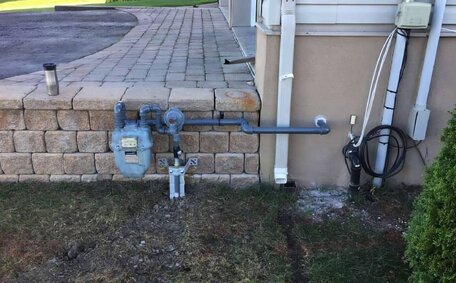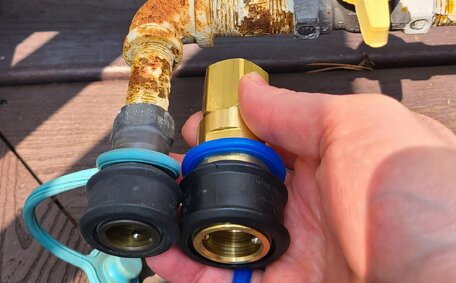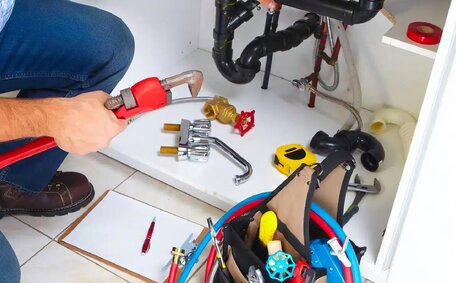Overview of natural gas and its uses
Natural gas is an odourless, colourless gas that forms underground and is used as a fuel source. It is composed primarily of methane and is piped into homes and businesses to provide energy for heating, cooking, and generating electricity.
Here are some of the main uses of natural gas:
- Heating - Natural gas furnaces and boilers heat air and water efficiently for home and commercial heating systems.
- Cooking - Ranges, ovens, cooktops, and other appliances use natural gas as their energy source.
- Clothes Drying - Most gas dryers rely on natural gas to heat the air that dries clothes.
- Water Heating - Natural gas is used to heat water for domestic uses like showers and dishwashing.
- Generators - Natural gas generators provide electricity during power outages.
Natural gas plays a vital role in meeting our energy needs safely and reliably. Understanding how to properly handle natural gas through inspections, maintenance, and leak detection is crucial to prevent accidents in homes and businesses.
What causes gas leaks?
There are several potential causes of hazardous gas leaks in homes and businesses:
Faulty Appliances
Gas appliances like water heaters, dryers, stoves, and furnaces account for many leaks. Some common appliance issues include:
- Cracked heat exchangers or vents
- Loose fittings, connections, or valves
- Faulty pilot lights
- Rust and corrosion
Deteriorating Pipes
Ageing, damaged, or improperly installed gas lines and pipes can spring dangerous leaks. Pipe problems include:
- Cracks from shifting foundations or freezing temperatures
- Corrosion from moisture
- Loose joints
- Incorrect materials or improper fittings
Damaged Valves
Faulty gas shut-off valves can cause gas to leak into the home. This may happen from normal wear and tear or improper valve installation.
Outside Forces
Gas lines can be damaged during digging, construction, or a natural disaster. Tree roots can also break pipes over time.
If you suspect any issues with appliances, pipes, or valves, have a licenced professional inspect and repair them immediately to prevent gas leak dangers.
The dangers of gas leaks
Gas leaks present serious dangers that should never be ignored. Even small leaks have the potential to cause deadly explosions, fires, and health hazards.
Explosion and Fire Risk
Natural gas is highly flammable and explosive. Gas concentrations as low as 5% can ignite from a small spark or open flame source. This can lead to devastating explosions that destroy buildings and endanger lives.
Gas leaks tend to fill low-lying areas first. Over time, the gas can accumulate until reaching explosive concentrations. It only takes the flick of a light switch or appliance turning on to ignite the gas and obliterate a structure.
Asphyxiation Hazard
High concentrations of leaking natural gas can also displace oxygen in confined areas. This oxygen deficiency presents a significant asphyxiation hazard. People in affected areas can lose consciousness within just a few breaths and die quickly without adequate oxygen.
Toxicity and Carbon Monoxide
Natural gas is mostly methane, which is non-toxic. However, it often contains trace amounts of toxic hydrogen sulphide. Prolonged low-level exposure can cause headaches, dizziness, and eye irritation.
More dangerously, incomplete combustion from gas appliances can produce deadly carbon monoxide gas. Carbon monoxide is invisible, odourless, and can kill swiftly through oxygen deprivation.
If you ever suspect a gas leak, evacuate the building immediately and call emergency services. Never ignore the risk or try DIY fixes. Gas leaks should only be repaired by qualified professionals to avoid catastrophic consequences.
How to detect a gas leak
Detecting a natural gas leak quickly is crucial to prevent explosion hazards and exposure to toxic fumes. Here are some ways you can identify a gas leak in your home or business:
Smell
Natural gas is odourless, so suppliers add a rotten egg smell to act as a safety warning. If you detect this sulphur-like odour, you likely have a gas leak.
Be aware that you can lose sensitivity to the smell after prolonged exposure. Also, the smell can be filtered out by structures, so don’t assume a lack of odour means there is no leak.
Visual Signs
Look for these visual clues that may indicate a gas leak:
- Bubbles coming up in standing water
- Dirt or dust blowing from a gas line
- Dead or dying vegetation near gas equipment
- Flames coming from the ground or burnt vegetation
- Condensation or frost forming on a gas line
Audible Hints
Listen for these sounds that may signal a gas leak:
- Hissing, whistling or roaring coming from gas appliances or lines
- Unusual banging or hammering on gas equipment
Equipment Issues
Be alert for appliance problems that can cause gas leaks:
- Unexplained flames around appliances
- Continuously running pilot lights
- Frequent appliance shutdowns
- Slow appliance ignition
Trust your senses, inspect all gas equipment and call a professional if anything seems off. Leak detectors and combustible gas alarms provide additional monitoring to protect your home or business.
What to do if you suspect a leak
If you suspect a natural gas leak in your home or business, it is crucial to act quickly and cautiously to prevent any disastrous outcomes.
Evacuate Immediately
Your top priority should be to evacuate everyone from the building and surrounding area. Do not operate light switches, electronics, or appliances on your way out, as even a tiny spark could ignite the gas.
Avoid All Ignition Sources
Absolutely do not smoke or light matches or lighters anywhere near the site of the suspected leak. Additionally, do not start vehicles, generators, or any engine that could produce a spark.
Ventilate the Area
Open windows and doors to allow the gas to dissipate. Do not turn on any fans or ventilation systems, as their electrical components could spark an explosion.
Call the Gas Company
From a safe location, call your local gas utility or emergency services to report the leak and request assistance. Trained professionals have the expertise and specialised equipment to address the hazard.
Do Not Re-Enter
Under no circumstances should anyone re-enter the building until emergency crews confirm it is safe. Lingering gas poses an extreme risk of asphyxiation and explosion.
Your quick response to a suspected gas leak can prevent injury, save lives, and avoid catastrophic property damage. Do not attempt repairs yourself - always leave it to the experts.
Preventing gas leaks
Preventing hazardous gas leaks should be a priority for every home and business owner. While gas leaks can happen unexpectedly, there are various proactive maintenance steps you can take to help avoid them:
Conduct Regular Inspections and Maintenance
Have all gas appliances professionally inspected annually, and perform regular preventative maintenance like testing pipe fittings with leak detectors, checking burner flames, cleaning dusty equipment vents, and lubricating gas valves. This can catch minor issues before they turn into leaks.
Replace Old or Damaged Equipment
If gas appliances are getting outdated or you notice excessive corrosion, rust, or abnormalities, replace them with new, efficient models to prevent breakdowns. Also replace any visibly damaged pipes or supply lines.
Properly Vent Appliances
Ensure clothes dryers, furnaces, water heaters and any combustion appliances are properly vented outside. Blocked vents can lead to dangerous carbon monoxide buildup.
Install Gas Shut-Off Valves
Have easy-to-access gas shut-off valves installed on pipes leading to appliances and at the metre. This makes it simpler to stop the flow of gas in an emergency.
Use Gas Leak Detectors
Consider installing UL-listed natural gas detectors that can alert you to the presence of gas leaks around your home before they grow dangerous. Look for models with battery backup.
Seal Cracks and Holes
Caulk and seal any cracks, holes or openings in walls or foundations near gas lines to prevent leaks. Also keep the area around gas metres obstruction-free.
Learn How to Recognise Leaks
Familiarise yourself and family members with the smell of natural gas and steps to take if a leak is present. Prevention starts with education.
Being proactive about gas leak prevention can pay off tremendously by avoiding catastrophic damage, injuries, and costly repairs down the line. Contact a qualified plumber for help designing and implementing a complete gas safety plan tailored to your home or business.






